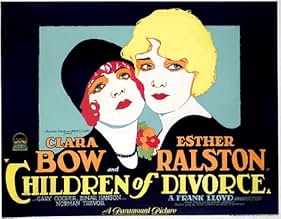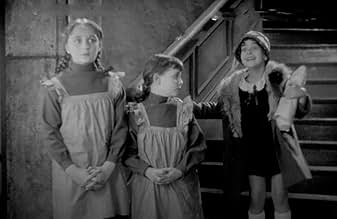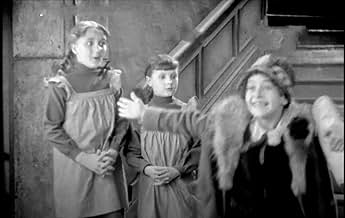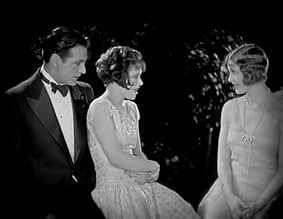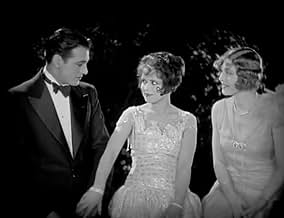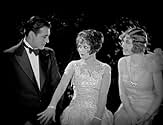Agrega una trama en tu idiomaA young flapper tricks her childhood sweetheart into marrying her. He really loves another woman, but didn't marry her for fear the marriage would end in divorce, like his parents'. Complica... Leer todoA young flapper tricks her childhood sweetheart into marrying her. He really loves another woman, but didn't marry her for fear the marriage would end in divorce, like his parents'. Complications ensue.A young flapper tricks her childhood sweetheart into marrying her. He really loves another woman, but didn't marry her for fear the marriage would end in divorce, like his parents'. Complications ensue.
- Dirección
- Guionistas
- Elenco
- Boarding School Student
- (sin créditos)
- Party Guest
- (sin créditos)
Opiniones destacadas
The film is what amounts to a polemic on the hazards of divorce but is not without merit. There are several poignant, sentimental moments which hold up due to some very competent performances, even by Cooper himself in his first big part. The year is 1927 and the film holds some very outdated views of marriage and divorce but, as often with silents, they must be viewed with a sense of atavism, as when one goes to a museum - or, in this case, a film festival. (Capitolfest, Rome, N.Y., 8/12/16.
By their next onscreen encounter, Cooper was elevated to be the male lead, albeit in a very female centric melodrama. "Children of Divorce" is a morality tale that asks, whether children of divorced couples are more likely to become divorcees themselves. Thus, its attempt is to glorify the sacred nature of marriage by casting shame on divorced couples. It's not a subtle film. Like many a silent film, it begins with the characters as children. All three, Jean (Ralston), Kitty (Bow) and Ted (Cooper) were raised in a children's home run by nuns, because their rich, divorced parents couldn't bother to take care of the kids themselves. As they grow up, Jean and Ted are in love and want to marry, but Kitty also has an eye for Ted.
The contrast between Jean and Kitty is shown to be night and day. Jean is respectful, "wife material" so to say, while Kitty is a carefree flapper who likes to have fun. During a night when he gets drunk, Kitty tricks Ted into marrying him, and when it's announced that they are going to have a child, Jean won't allow Ted to divorce Kitty, because then world would have one more child of divorce. If you can't guess the outcome, you probably haven't watched too many silent melodramas.
I have mixed feelings about this film. The core merit it has going on, is the presence of Bow and Cooper, who are both very charismatic. The film is worth watching solely because of them. I dislike films that give such a black and white separation of good girls and bad girls. From my perspective, probably from today's perspective, Ralston appears boring and lifeless, while Clara Bow's charm has not been damaged by the years. I for one would love to wake up and discover myself married to a girl like Kitty. The film is heavy-handed with its marital themes, and it feels like it tries to brainwash the female audience into obedient housewives and dutiful mothers. Clara Bow is another alternative for a female role model, and therefore must be destroyed. "It" presented Bow's sex appeal in a lively way, and allowed it to exist. This film looks down on her, even if she is the star.
I also have never liked the American notion of "childhood sweethearts must marry as adults" in films. This is nonsense. It is very unlikely, that the first person of the opposite sex that you meet, is going to be the most suitable marital candidate you will ever meet. Therefore films like this, that tell the audience how Ted and Jean must be re-united, because they loved each other a long time ago, don't really hit home for me. There is even a creepy scene, where Ted stares at Jean, who is comforting his child, and imagines Jean as a little girl. It played the wrong way in this context, sorry.
So all in all, as a narrative, this doesn't hold up even a bit. But it does show how Cooper can act and led to better parts for him. Clara Bow may be the bad woman here, but she is easily the most memorable thing in the film.
Ralston claims being on the set with the 22-year-old Clara was both enjoyable and scandalous. She recalls Bow describing in detail where and how she and her actor boyfriend Cooper made love, causing cast members to experience a red glow on their faces listening to such escapades. Bow also saved Cooper's budding career by intervening on his behalf when Lloyd threatened to release the young actor for constantly not remembering his movements in a early scene. Cooper's visibility in "Children of Divorce" catapulted his screen presence, launching him towards Hollywood stardom.
As for Clara, "Children of Divorce" provided her with one of the most dramatic scenes in her growing portfolio. Near the film's ending, Bow's character swallows poison because she realizes she can't marry a prince. She lays in bed comforted by her childhood friend Jean, who forgives her for her past indiscretions. The dramatic sequence's atmosphere required more than director Lloyd provided. So Paramount brought in young director, Josef von Sternberg, who was gaining a reputation for his expert lighting, to reshoot Kitty's final moments. His genius was to provide the shadow of a curtain sweeping over her as the nun lowers the wondow drape, emphasizing the end of Kitty's tempestuous life.
The highlights of the picture are Clara Bow and Gary Cooper. Cooper playes his role evenhandedly. He is remarkable rather because of his later stardom than because his acting here is particularly outstanding. Bow, by contrast, is outstanding. She starts out as a careless flapper and ends as a desparately unhappy woman who sees suicide as her only way out, and every detail and moment of this transition is absolutely convincing. The plot is obviously pretty convoluted and heavy on morals. It does lay it on rather thick, I must say. The viewers are clearly expected to take away the message that divorce was to be avoided at all costs (Kitty's, Jean's and Ted's parents are all divorced, and it is Kitty's divorced mother whose idea of marriage is at the bottom of all the trouble). I am generally no fan of films that try to educate the audience in such a way, but in this case Clara Bow's performance makes up for the deficiencies, at least to a very large extent. All in all, the upsides of 'Children of Divorce' (meaning her and Cooper) outweigh the downsides by quite a bit. In sum: good film.
This movie is a divorce trial and of wedding trial. To Avoid divorce try to succeed your marriage, it's seems evident but haw many people really think of that ?
Traumatised by abandon Kitty & Jean wanted 2 things, first never divorce, so make a good marriage.
It's such a moving Clara, who make you cry for sure, apparently she's seems happy, but inside juste broken and desperate, she always made the wrong things, thinking of course they was the best things to do,...
A movie who is still topical , even if actually divorced children are no longer abandonned.
Eternal questions: What is the way to succeed a marriage ? If it fails, divorce is a solution but how doing it softly for kids ? etc...
¿Sabías que…?
- TriviaJosef von Sternberg was called in by Paramount to reshoot some scenes, shoot new scenes and recut the existing footage after executives made the determination that the film was not releasable.
- Citas
Kitty Flanders: You'd make a marvelous second husband but you are too much of a luxury for a poor girl's first husband.
- ConexionesFeatured in Hollywood (1980)
Selecciones populares
- How long is Children of Divorce?Con tecnología de Alexa
Detalles
- Fecha de lanzamiento
- País de origen
- Sitio oficial
- Idioma
- También se conoce como
- Skilsmässornas barn
- Locaciones de filmación
- Productora
- Ver más créditos de la compañía en IMDbPro
- Tiempo de ejecución
- 1h 10min(70 min)
- Mezcla de sonido
- Relación de aspecto
- 1.33 : 1


